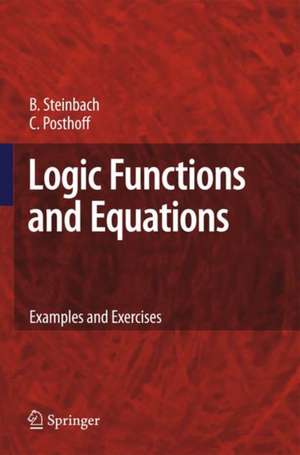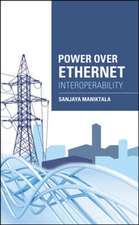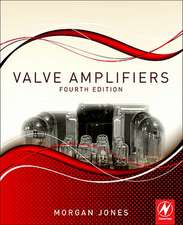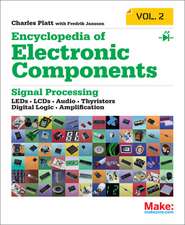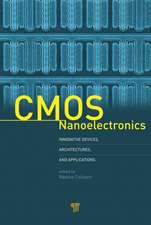Logic Functions and Equations: Examples and Exercises
Autor Bernd Steinbach, Christian Posthoffen Limba Engleză Hardback – 12 feb 2009
| Toate formatele și edițiile | Preț | Express |
|---|---|---|
| Paperback (3) | 395.79 lei 3-5 săpt. | +58.30 lei 4-10 zile |
| Springer International Publishing – 8 iun 2023 | 395.79 lei 3-5 săpt. | +58.30 lei 4-10 zile |
| Springer Us – 13 dec 2011 | 465.17 lei 38-44 zile | |
| SPRINGER NETHERLANDS – 19 oct 2010 | 643.50 lei 6-8 săpt. | |
| Hardback (2) | 649.75 lei 6-8 săpt. | |
| SPRINGER NETHERLANDS – 12 feb 2009 | 649.75 lei 6-8 săpt. | |
| Springer International Publishing – 7 iun 2022 | 684.38 lei 6-8 săpt. |
Preț: 649.75 lei
Preț vechi: 812.19 lei
-20% Nou
Puncte Express: 975
Preț estimativ în valută:
124.34€ • 135.02$ • 104.45£
124.34€ • 135.02$ • 104.45£
Carte tipărită la comandă
Livrare economică 22 aprilie-06 mai
Preluare comenzi: 021 569.72.76
Specificații
ISBN-13: 9781402095948
ISBN-10: 1402095945
Pagini: 256
Ilustrații: XXII, 232 p.
Dimensiuni: 155 x 235 x 25 mm
Greutate: 0.54 kg
Ediția:2009
Editura: SPRINGER NETHERLANDS
Colecția Springer
Locul publicării:Dordrecht, Netherlands
ISBN-10: 1402095945
Pagini: 256
Ilustrații: XXII, 232 p.
Dimensiuni: 155 x 235 x 25 mm
Greutate: 0.54 kg
Ediția:2009
Editura: SPRINGER NETHERLANDS
Colecția Springer
Locul publicării:Dordrecht, Netherlands
Public țintă
ResearchCuprins
Basic Software.- XBOOLE Monitor.- Basics and Logic Functions.- Logic Equations.- Boolean Differential Calculus.- The Solution of Logic Equations.- Applications.- Logics and Arithmetics.- Combinatorial Circuits.- Finite-State Machines.
Recenzii
From the reviews:
"The authors have developed a logic system called XBOOLE which performs logical operations on the given functions, helping the readers to solve the problems given in the book. Many examples and complete solutions to the problems are shown, so the readers can study at home. … This book, allowing to learn from examples is very useful not only for the students, but also the professors." (Ioan Tomescu, Zentralblatt MATH, Vol. 1166, 2009)
"The authors have developed a logic system called XBOOLE which performs logical operations on the given functions, helping the readers to solve the problems given in the book. Many examples and complete solutions to the problems are shown, so the readers can study at home. … This book, allowing to learn from examples is very useful not only for the students, but also the professors." (Ioan Tomescu, Zentralblatt MATH, Vol. 1166, 2009)
Textul de pe ultima copertă
The field of binary Logics has two main areas of application, the Digital Design of Circuits (related to Electrical Engineering) and Propositional Logics (related to Mathematics, Artificial Intelligence, Complexity etc.). In both cases it is quite possible to teach the theoretical foundations and to do some exercises, but in both cases the examples that can be done in class and by hand are far away from examples that are relevant for practical problems. Therefore a software package called XBOOLE Monitor will be made available (downloadable, without additional fees), and the exercises given in Logic Functions and Equations can be solved by using this software package – in this way it is possible to solve a lot of relevant problems and to study the solutions based on this software.
The whole approach is based on the single and unique concept of Boolean Equations and Ternary Vectors as the basic data structure which makes it also easy to follow these ideas very easily, because the wide range of problems and solutions will be based on these two concepts.
The whole approach is based on the single and unique concept of Boolean Equations and Ternary Vectors as the basic data structure which makes it also easy to follow these ideas very easily, because the wide range of problems and solutions will be based on these two concepts.
Caracteristici
The first book in the area of binary systems that is fully based only on Logic Equations as the theoretical concept. Ternary vectors are the only data structure required for the implementation of the algorithms. The software package XBOOLE Monitor is an integral part of the training and solution process. Many problems where no solutions can be found by hand can be approached in a constructive way. The full applicability of the Boolean Differential Calculus. Includes supplementary material: sn.pub/extras
Notă biografică
Bernd Steinbach studied Information Technology at the University of Technology in Chemnitz (Germany) and graduated with an M.Sc. in 1973. He graduated with a Ph.D. and with a Dr. sc. techn. (Doctor scientiae technicarum) for his second doctoral thesis from the Faculty of Electrical Engineering of the Chemnitz University of Technology in 1981 and 1984, respectively. In 1991 he obtained the Habilitation (Dr.-Ing. habil.) from the same Faculty. Topics of his theses involved Boolean equations, Boolean differential equations, and their application in the field of circuit design using efficient algorithms and data structures on computers.
He was working in industry as an Electrician, there he tested professional controlling systems at the Niles Company. After finishing his studies, he taught as Assistant Lecturer at the Department of Information Technology of the Chemnitz University of Technology. In a following period of industrial occupation as a research engineer he developed programs for test pattern generation for computer circuits at the company ROBOTRON. Thereafter he returned to the Department of Information Technology of the Chemnitz University of Technology as Associate Professor for design automation in logic design.
From 1992 to 2017 he was a Full Professor of Computer Science / Software Engineering and Programming at the Freiberg University of Mining and Technology, Department of Computer Science. He served as Head of the Department of Computer Science and Vice-Dean of the Faculty of Mathematics and Computer Science. His research areas include logic functions and equations and their application in many fields, such as Artificial Intelligence, UML - based testing of software, UML - based hardware / software co-design, and extremely complex problems. He is the head of a group that developed the XBOOLE software system. He is co-author and editor of 19 books. He published more than 280 chapters in books, complete issuesof journals, and papers in journals and proceedings.
He has served as Program Chairman for the IEEE International Symposium on Multiple-Valued Logic (ISMVL), and as guest editor of the Journal of Multiple-Valued Logic and Soft Computing. He is the initiator and was the general chair of the first 12 workshops of a biennial series of International Workshops on Boolean Problems (IWSBP), which started in 1994. He received the Barkhausen Award from the University of Technology Dresden in 1983.
Christian Posthoff studied Mathematics at the University of Leipzig. From 1968 to 1972, he worked as a programmer and in the field of Operations Research; simultaneously, he did his Ph.D. in 1975 with the thesis "Application of Mathematical Methods in Communicative Psychotherapy". In 1972, he began working at the Department of Information Technology at the Chemnitz University of Technology; up to 1983, his research activities concentrated on logic design. Important results have been algorithms and programs for solving Boolean equations with a high number of variables and the Boolean Differential Calculus (a generalized differential and integral calculus for Boolean rings) for the analytical treatment of different problems in the field of logic design. These results have been collected in a monograph "Binary Dynamic Systems", and allowed the habilitation (Dr.-Ing. habil.) at the Faculty of Electrical Engineering in 1979 and the promotion to Associate Professor. In 1983, he was promoted to Full Professor of Computer Science in the Department of Computer Science at the same university, and since 1984, he was Head of the Institute of Theoretical Computer Science and Artificial Intelligence and Research Director of the Department of Computer Science. His research activities included the application of fuzzy logics for the modeling of human-like "thinking" methods, learning from examples, the construction of intelligent tutoring systems, the parallelization of inference mechanisms, systems of diagnosis and configuration. He received the Scientific Award of the Chemnitz University of Technology four times.
In 1994, he moved to the Chair of Computer Science at The University of The West Indies, St. Augustine, Trinidad & Tobago. From 1996 to 2002 he was Head of the Department of Mathematics & Computer Science. He mainly focused on the development of Computer Science education at the undergraduate and graduate levels to attain international standard. Twenty years later it can be said that these intentions were very successfully fulfilled. In 2001, he received the Vice-Chancellor's Award of Excellence. From 2010 – 2012 he spent two years at St. Georges University in Grenada with the same goals. Since his return to Germany (now retired) he devoted his efforts to the interdisciplinary research and education in several areas (ComputerScience – Mathematics – Applications in different fields). He is the author or co-author of more than 25 books and many publications in journals and conference proceedings.
He was working in industry as an Electrician, there he tested professional controlling systems at the Niles Company. After finishing his studies, he taught as Assistant Lecturer at the Department of Information Technology of the Chemnitz University of Technology. In a following period of industrial occupation as a research engineer he developed programs for test pattern generation for computer circuits at the company ROBOTRON. Thereafter he returned to the Department of Information Technology of the Chemnitz University of Technology as Associate Professor for design automation in logic design.
From 1992 to 2017 he was a Full Professor of Computer Science / Software Engineering and Programming at the Freiberg University of Mining and Technology, Department of Computer Science. He served as Head of the Department of Computer Science and Vice-Dean of the Faculty of Mathematics and Computer Science. His research areas include logic functions and equations and their application in many fields, such as Artificial Intelligence, UML - based testing of software, UML - based hardware / software co-design, and extremely complex problems. He is the head of a group that developed the XBOOLE software system. He is co-author and editor of 19 books. He published more than 280 chapters in books, complete issuesof journals, and papers in journals and proceedings.
He has served as Program Chairman for the IEEE International Symposium on Multiple-Valued Logic (ISMVL), and as guest editor of the Journal of Multiple-Valued Logic and Soft Computing. He is the initiator and was the general chair of the first 12 workshops of a biennial series of International Workshops on Boolean Problems (IWSBP), which started in 1994. He received the Barkhausen Award from the University of Technology Dresden in 1983.
Christian Posthoff studied Mathematics at the University of Leipzig. From 1968 to 1972, he worked as a programmer and in the field of Operations Research; simultaneously, he did his Ph.D. in 1975 with the thesis "Application of Mathematical Methods in Communicative Psychotherapy". In 1972, he began working at the Department of Information Technology at the Chemnitz University of Technology; up to 1983, his research activities concentrated on logic design. Important results have been algorithms and programs for solving Boolean equations with a high number of variables and the Boolean Differential Calculus (a generalized differential and integral calculus for Boolean rings) for the analytical treatment of different problems in the field of logic design. These results have been collected in a monograph "Binary Dynamic Systems", and allowed the habilitation (Dr.-Ing. habil.) at the Faculty of Electrical Engineering in 1979 and the promotion to Associate Professor. In 1983, he was promoted to Full Professor of Computer Science in the Department of Computer Science at the same university, and since 1984, he was Head of the Institute of Theoretical Computer Science and Artificial Intelligence and Research Director of the Department of Computer Science. His research activities included the application of fuzzy logics for the modeling of human-like "thinking" methods, learning from examples, the construction of intelligent tutoring systems, the parallelization of inference mechanisms, systems of diagnosis and configuration. He received the Scientific Award of the Chemnitz University of Technology four times.
In 1994, he moved to the Chair of Computer Science at The University of The West Indies, St. Augustine, Trinidad & Tobago. From 1996 to 2002 he was Head of the Department of Mathematics & Computer Science. He mainly focused on the development of Computer Science education at the undergraduate and graduate levels to attain international standard. Twenty years later it can be said that these intentions were very successfully fulfilled. In 2001, he received the Vice-Chancellor's Award of Excellence. From 2010 – 2012 he spent two years at St. Georges University in Grenada with the same goals. Since his return to Germany (now retired) he devoted his efforts to the interdisciplinary research and education in several areas (ComputerScience – Mathematics – Applications in different fields). He is the author or co-author of more than 25 books and many publications in journals and conference proceedings.
Descriere
Descriere de la o altă ediție sau format:
Logic functions and equations are (some of) the most important concepts of Computer Science with many applications such as Binary Arithmetics, Coding, Complexity, Logic Design, Programming, Computer Architecture and Artificial Intelligence. They are very often studied in a minimum way prior to or together with their respective applications. Based on our long-time teaching experience, a comprehensive presentation of these concepts is given, especially emphasising a thorough understanding as well as numerical and computer-based solution methods. Any applications and examples from all the respective areas are given that can be dealt with in a unified way. They offer a broad understanding of the recent developments in Computer Science and are directly applicable in professional life.
Logic Functions and Equationsis highly recommended for a one- or two-semester course in many Computer Science or computer Science-oriented programmes. It allows students an easy high-level access to these methods and enables sophisticated applications in many different areas. It elegantly bridges the gap between Mathematics and the required theoretical foundations of Computer Science.
Logic functions and equations are (some of) the most important concepts of Computer Science with many applications such as Binary Arithmetics, Coding, Complexity, Logic Design, Programming, Computer Architecture and Artificial Intelligence. They are very often studied in a minimum way prior to or together with their respective applications. Based on our long-time teaching experience, a comprehensive presentation of these concepts is given, especially emphasising a thorough understanding as well as numerical and computer-based solution methods. Any applications and examples from all the respective areas are given that can be dealt with in a unified way. They offer a broad understanding of the recent developments in Computer Science and are directly applicable in professional life.
Logic Functions and Equationsis highly recommended for a one- or two-semester course in many Computer Science or computer Science-oriented programmes. It allows students an easy high-level access to these methods and enables sophisticated applications in many different areas. It elegantly bridges the gap between Mathematics and the required theoretical foundations of Computer Science.
